This tour provides an introduction to the features and sections of this resource, to make it simpler to use and easier for you to find the information you need. Use the back and forward arrows to move from screen to screen.

Home page
The Home page, where you started, includes links to the Overview, RPL pathway and the resource itself, as well as a link to this tour.

Overview
The Overview page, accessed from the home page, includes the unit elements and performance criteria and details about employability skills and assessment.
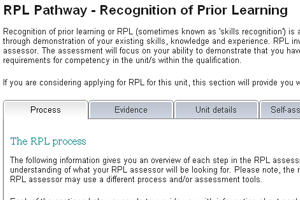
RPL Pathway
In this section you can find out all about RPL (Recognition of Prior Learning). If you have existing skills and knowledge in the building and construction industry you may be eligible for RPL, a formal process of assessment in which you’ll be required to demonstrate your competency.
The information within the RPL Pathway section can help you prepare for an RPL assessment, however you should check first with your trainer or assessor to see whether you’re likely to be successful in gaining RPL.
Click the tabs to find out about each step of the process and access supporting resources.
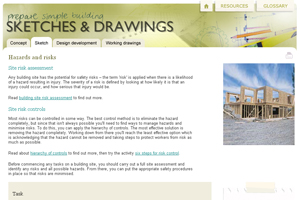
Topic navigation
The resource is divided into four topics:
- Concept
- Sketch
- Design development
- Working drawings.
Each of these can be accessed by clicking on the matching topic tab near the top of the page. The topics work best if completed in order, from left to right.
Near the top right hand side of the page is the Home button. Selecting this will take you back to the Home page, where the Overview, RPL pathway and this Tour can be accessed.
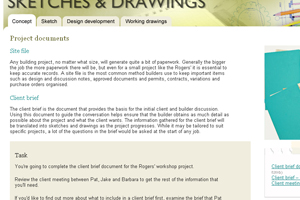
Topic pages
The topic pages lead you through the learning for the unit. They are a combination of information, activities and tasks.
Some activities open in a new window to allow you to consult the information from the topic page during the activity.
Many pages have additional resources that provide more detail about the topic or support for the tasks. These resources can be accessed either by selecting the blue on-page link or visiting the resources index via the Resources button at the top of every page.
Tasks are contained in the task box. This will often have a notepad alongside it containing handy links to any resources related to that task.
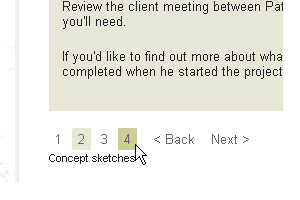
In-topic navigation
At the bottom of each topic page is the page navigation. There is one numbered button for each page in that topic. The button corresponding to the page you are on will be shaded.
Moving your mouse over each of the page buttons will highlight the number and display the title of that page, to make it easier to find the page you are looking for. Clicking on a number takes you straight to that page. You can move back or forward one page by selecting the Back or Next button.
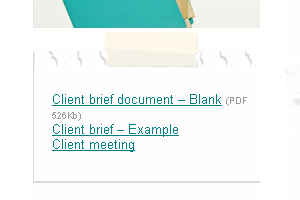
Interactive resources
There are a variety of interactive resources for you to explore. Access these by selecting the link in the on-screen notes box or visiting the resources index via the Resources button at the top of every page. Your selected resource will open in a new window. Use your mouse or keyboard to explore them. You can also download these resources to print or save them locally.
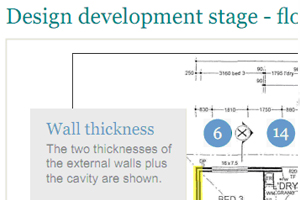
Interactive resources - PDFs
Several interactive plans, presented as PDFs, can be explored on-screen. You can also print these out or save a copy locally if you wish.
Using your mouse
Roll over each number to highlight an element of the plan and its name or label. Click on the number to reveal an explanation of that element. Move your mouse away from the number to remove the highlight and hide the explanation text.
Using your keyboard
Press the Tab key to select the first number. A small box will appear around the selected number, the first plan element will be highlighted and an explanation of that element will be displayed. Press Tab twice to move onto the next numbered feature.
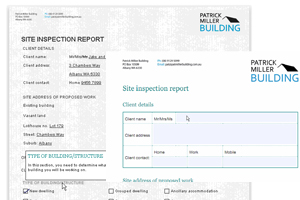
Interactive resources - forms
There are also several interactive forms for you to explore, accessed in the same way as the PDFs. You can use your mouse or your Tab key to navigate them.
Some are provided for information as examples of completed documents. Rolling over elements in these resources will reveal additional information about that element.
Others are provided for you to complete. These have interactive grey boxes (form fields) in them that can be typed into.
All of these resources can be downloaded to print or save locally.
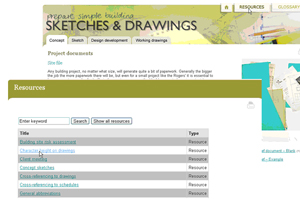
Resources index
The resources that support the learning in this unit can all be found in the Resources repository. To find what you are looking for, you can either scroll through the list or type a keyword into the search box.

Glossary
Throughout this resource you'll notice some words or terms have a dotted underline. These are new or more difficult words that you may need a definition for.
Clicking on these dotted underlined items will reveal a popup with a definition of the word or term. Or you can open the entire glossary and familiarise yourself with lots of new terms. Just select the Glossary button from the top of any page to open it in a new window.

Accessibility
Text versions (or text alternatives) are simpler plain text versions provided for some of the more complex interactions and resources. They can be a useful alternative if, for example, you have a slower internet connection or a missing plug-in.
They are indicated on the topic page by the words text version in blue underlined font. Selecting the link will open the text version in a new window.